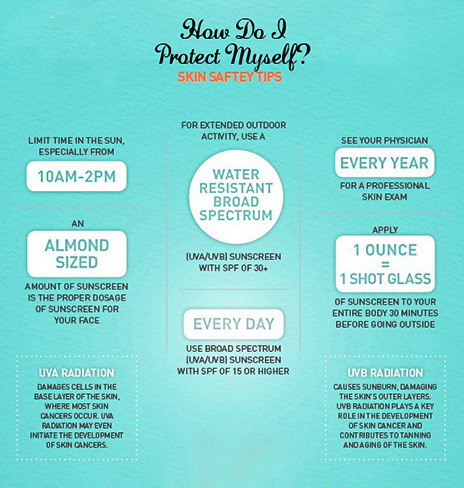Sunscreens help shield you from the sun’s dangerous ultraviolet (UV) rays in two ways. Some work by scattering the light, reflecting it away from your body. Others absorb the UV rays before they reach your skin. So which is the best sunscreen for you? Clearly, you’ll want a sunscreen with broad-spectrum or multi-spectrum protection for both UVB and UVA. As with any purchase, it pays to do your homework. To that end, here are some tips to help you find the right sunscreen to keep you and your family free from sun-damaged skin this summer.

The SPF rating that you see on sunscreen packaging tells you how effective a product will be for protecting you and your family from UVB rays. Never think about using any sunscreen with an SPF rating lower than 15. If you tend to prefer staying in the shade, SPF 15 should be fine. However, if your skin is very fair or you suffer with any condition which makes your skin sensitive to sunlight, choose a higher rating such as SPF 30.
No matter how high the SPF rating of your sunscreen, it provides no indication of the product’s ability to protect your skin from UVA rays. Instead you should select a sunscreen according to its makeup. Ingredients with broad-spectrum protection include benzophenones (oxybenzone), cinnamates (octylmethyl cinnamate and cinoxate), sulisobenzone, salicylates, titanium dioxide, zinc oxide, avobenzone (Parsol 1789) and ecamsule (Mexoryl SX). All of these ingredients are known as UVA blockers. The price of sunscreen will vary a lot according to these ingredients.
Regardless of advertising, promotions and manufacturers claims, it’s important to choose a product which you like the smell and texture of.
Consider sweat and water resistant brands. This tip is especially important if you will be playing sports, exercising or swimming in the sun.
If you or any of your family have extra-sensitive skin or suffer with allergies, you will need to be particularly careful about your choice of sunscreen. In that case you need to avoid ingredients like Para-aminobenzoic acid, Dioxybenzone, Oxybenzone and Sulisobenzone.
To be really safe, babies under six months old should not be exposed to any but a very small amount of direct sunlight. However, if you do need a sunscreen for a baby, follow the guidelines mentioned above for sensitive skin.
It makes no sense to buy that drug store sunscreen that claims to be rated at 100 SPF. Even if the rating is correct, the amount of extra protection offered over a 50 SPF product is a minute. Sunscreen of SPF 50 blocks 98% of UVB rays. Even a product rated at 15 SPF blocks 93%. No product blocks 100% of UVB radiation.
Before buying a sunscreen, make sure you have agreed to the above points and tips mentioned J